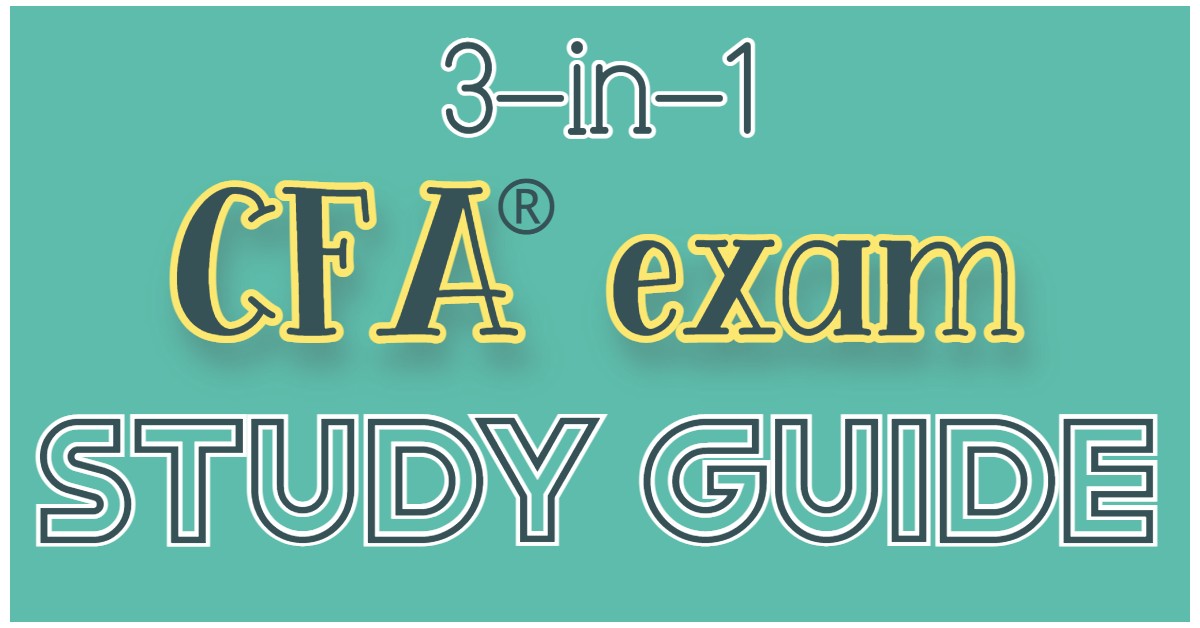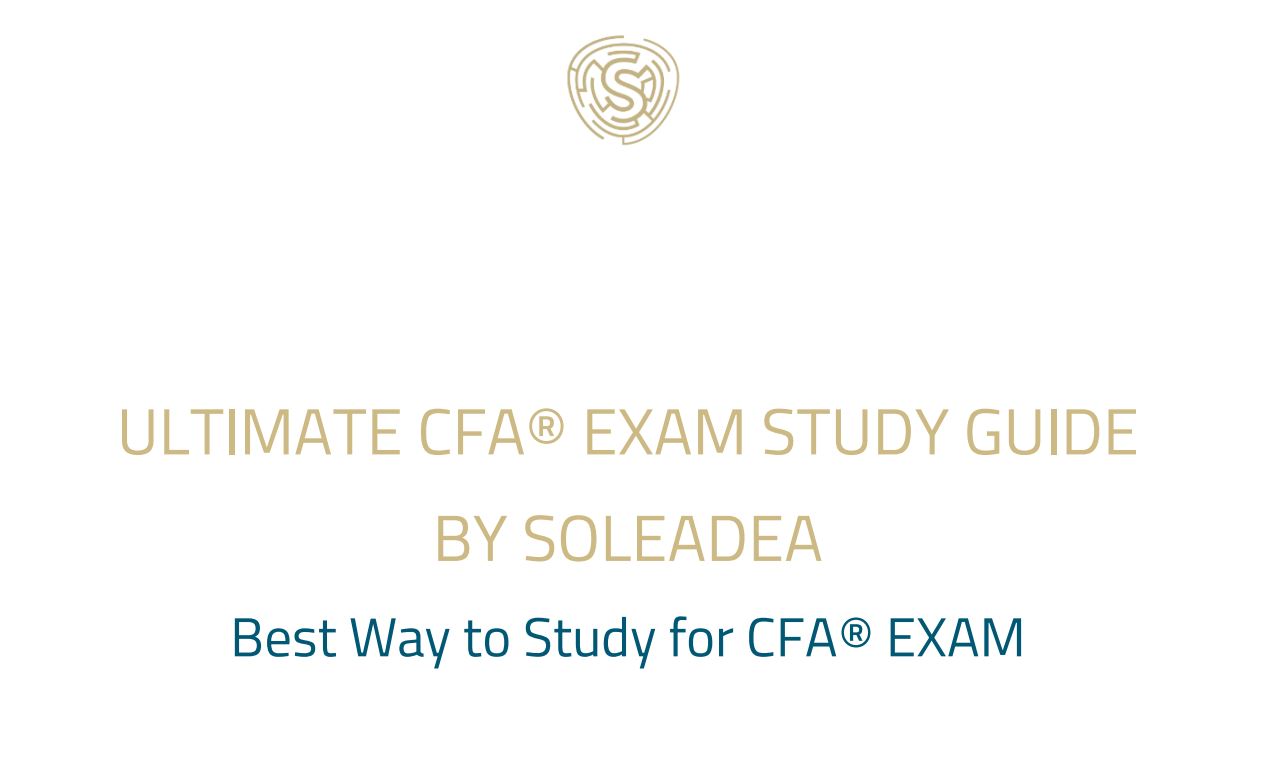
Best Way to Prepare for CFA® Exam
When you prepare for your CFA exam, the best way is to use other CFA candidates’ experience as a guide. CFA candidates commonly report around 300 hours of level 1 CFA exam preparation and they say that the best way to manage 300 hours of CFA exam prep is to have a good study schedule.
Importantly, those CFA candidates who took their CFA exam recently on computers say that it can be as stressful as when the CFA exam was paper-based. Even though there’s now a total of 180 exam questions (compared to 240 exam questions in the past) – you still need to be very careful with how you manage your exam time (which is now reduced from 6 hours to 4.5 hours of exam taking).
As far as the CFA exam difficulty is concerned, the level 1 CFA exam is said to be the easiest of the 3 CFA exam levels you need to pass to obtain a CFA Charter. However, not everyone can become a CFA charterholder and not everyone can take the level 1 CFA exam. There are strict CFA Program requirements that you need to satisfy if you want to register for your level 1 CFA exam.
Must-Meet CFA Exam Guidelines
CFA Program Entrance Requirements:
To register for your level 1 CFA exam, you must:
- be a university student who's within 23 months (or less) of graduation OR
- have a bachelor’s (or equivalent) degree OR
- have a combination of professional work experience (investment-related or not) and/or higher education totaling 4,000 hours and acquired over a minimum of 3 sequential years (education and work cannot overlap).
- [read more about CFA exam requirements ]
CFA Charterholder Requirements:
To become a CFA charterholder, you must have:
- all 3 levels of the exam completed AND
- at least 4,000 hours of relevant investment-related work experience, completed in a minimum of 36 months (full-time and part-time jobs, as well as remote work arrangements – before, during, or after your participation in the CFA® Program – qualify).
- [read more about work experience requirements ]
Top Study Tips for Guided CFA Exam Prep
The best way to prepare for the CFA exam in 9 steps:
- 300 STUDY HOURS: Follow this study time guideline that most CFA candidates recommend. 300 hours is the average study time you need to prepare for your level 1 CFA exam!
- STUDY PLAN: CFA candidates always schedule their CFA exam topics and readings to handle them successfully. Best choose a study plan that easily adapts to what happens daily while still keeping you accountable.
- STUDY STRATEGY: Adopt a WEEK-to-WEEK attitude that ensures you stay in control even with some bad study weeks along the way! For this, our CFA exam study strategy of PLAN – STUDY – REVIEW – ASSESS applied weekly may be just perfect.
- STUDY MATERIALS: Employ various study tools and materials to aid your knowledge retention. Inside our study planner, you’ll find videos, tests, e-books, Formulas App, etc. – but you can use our study planner also with Schweser study materials (or any other resources you have).
- PRACTICE: It is important that you get to know the CFA exam structure and the format of exam questions. If you practice regularly with exam-type practice questions and CFA exam mocks – you’ll be prepared to the best of your abilities for the exam day.
- REVIEW: Always review after you study to help your learning curve grow. Topic review or final review are fine but may be not enough to overcome your forgetting! That’s why our study planner schedules regular review sessions alongside study lessons.
- PROGRESS: Remember: numbers never lie – if you get too many readings and study hours overdue – your chance to pass naturally decreases. You can keep track of your study progress, e.g., by watching your Chance-to-Pass score included in your study plan.
- MOTIVATION: Keep your motivation simmer. It won’t be 100 degrees Celsius all the time but you can’t let it cool. Some external motivation stimuli can help you here.
- GROWTH APPROACH: Never stop learning how to learn. Growth in this aspect leads straight to success!
How Is Your CFA Exam Prep So Far?
... that’s why you’re looking for the best way to study for the CFA exam?
Our ultimate CFA exam study guide binds the finest CFA exam study plan, study tips, and study materials together into one success-oriented approach. At the core of this approach is our STUDY PLANNER which offers you control, motivation, and knowledge retention, i.e., the 3 indispensable ingredients of successful CFA exam prep.
Read more about our ultimate CFA exam study guide below or in this printable PDF file with CFA exam study guidelines:

Controllable CFA Exam Study Plan That
Motivates You To Learn
Good study planning is based on 3 pillars:
- CONTROL to make sure you manage your CFA exam prep,
- MOTIVATION to make sure you execute your study plan,
- KNOWLEDGE RETENTION to make sure you truly learn while you study.
To keep those pillars strong – and build strong skills and competencies – you should apply a WEEK-to-WEEK attitude with concrete readings assigned to your study weeks.
Best CFA Exam Prep:
Building Aptitude Through Attitude
All CFA candidates are looking for study materials to get prepared for their exam. To satisfy the demand – prep providers offer countless videos, tests, e-books, etc. This shortened version of the CFA Program curriculum still requires months of preparation before you can acquire the essentials of each topic.
That leads us to our study planner – all candidates want to know when to start and when to end each topic to be prepared just in time for the test day.
But topic deadlines are not enough. Nor are videos and tests.
The 'study materials + study plan' package is just the bare basics stripped of the most vital game-changing aspect, namely the successful CFA exam prep approach! Every study plan out there implicitly assumes you will always stay motivated, manage all the topics before their deadlines, and know everything before your topic review ends.
This is too perfect... It never works this way!
Life makes us change our plans too often to be okay with a rigid study plan unprepared for any difficulties or delays.
To pass your CFA exam, you need a study plan that can allow for everyday imperfections over your whole exam prep without falling into pieces. You want to have a manageable study schedule, both flexible and systematic at the same time. To this end – you want to know when to start and end readings, not just topics. And above all – you want to stay motivated and see the effects of your work.
Your CFA Exam Prep Arranged Into Study Weeks
The key strategy that you should apply to your CFA exam prep is a WEEKLY approach.
The WEEKLY approach is the best for you because a WEEK is neither too short nor too long. Your CFA exam prep won’t go to pieces just because you have a bad week once in a while. That’s because it’s easier to catch up on some overdue weekly readings than a whole bunch of disorganized readings postponed for a month. In other words: it’s OK to be out-of-control for a week and then instantly back-in-control when the bad week ends. But it won’t happen unless you have the right means to manage your CFA exam study plan.
The WEEKLY approach – implemented into our study planner – puts you in charge!
Your exam prep is quickly under control after each bad week (as long as you ensure there are not too many of them ;D ). It’s possible only because you know exactly what to do each week, you can summarize how you did over a week, and then edit your next week the way you need. Also, with study plan features such as readings’ *done* status, your readings’ benchmark study times, study tips series for developing your study routine, and a detailed Chance-to-Pass measure based on your weekly performance – you get motivated to study. Plus, thanks to applying a proper review system and using review apps inside your study plan – you can experience efficient learning! You can read more about it all in our other blog posts.
Ultimate 3-in-1 CFA Exam Study Guide
flexible but systematic study plan
study tips for guided preparation
abridged study materials & review apps
When designing this Ultimate CFA Exam Study Guide with the Study Planner at its core, we kept 3 questions in our mind:
- What good is CFA exam prep without a study plan?
- What good is a study plan without execution?
- What good is execution without effects?
Now you get the study planner based on 3 pillars of successful CFA exam prep: control, motivation, and knowledge retention and YOU CAN:
We think it’s ultimate. Don’t you think?
Read Also:
3 PILLARS OF YOUR STUDY PREP:
Control
mess is the only alternative...>
Be your own CFA exam prep manager . See which readings to do each week. Mark them as done or partially done as you study. Control your progress every week on Sunday even – or especially – if you didn’t do all as scheduled. That’s OK. After you sum up one week, you can edit the next, e.g. add the overdue readings. But what you should do first is find out if you’re a Fixer or a Grower – because you’ll want to think differently about your exam prep depending on your profile. You can read more about it in our post on how to study for the CFA exam with success and stop the exam prep mess.
Motivation
here execution happens >
Actually, your motivation is at its peak only twice over your exam prep, i.e. just after you register for your exam and as the test day is getting closer. In the middle – when most of the studying should happen – your motivation drastically falls. This is pure irony, don’t you think? That’s why we call this phenomenon motivation smile ... We explain it in our post on how to be motivated to study for the CFA exam, where you can also learn how to employ both internal and external motivation to build your everyday study routine.
Knowledge Retention
when 'study' means 'learn' >
A human brain is designed to forget though it also has a great potential to remember much. To wake up this potential you need to take care of your learning curve using the right means. Otherwise, your forgetting curve will make you forget even up to 65% of what you studied today by tomorrow evening. This is how our brains work. Our information retention starts to drastically fall as we don’t use the info. There’s more to find out in our post on how to remember what you studied for the CFA exam, which not only promotes the habit of effective learning but also tells you why the Growers are lucky indeed!

